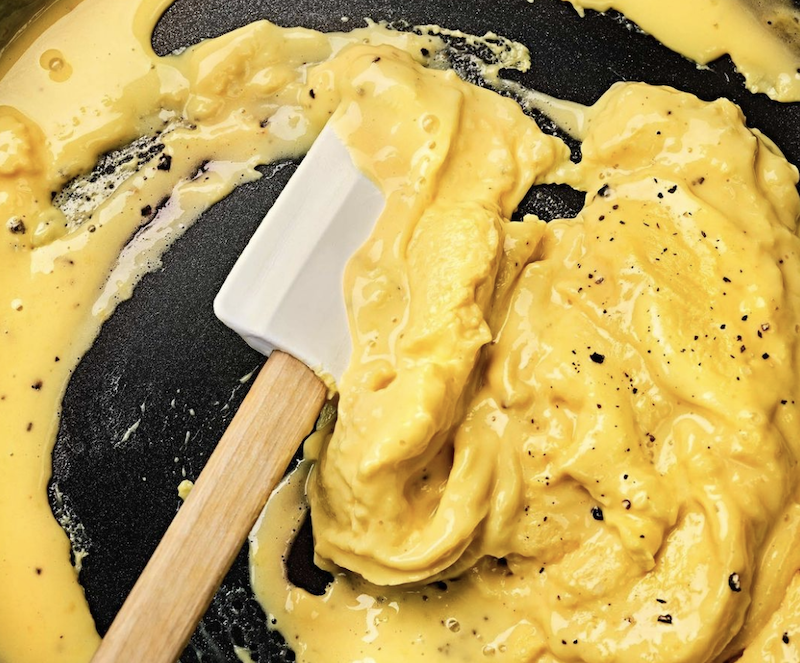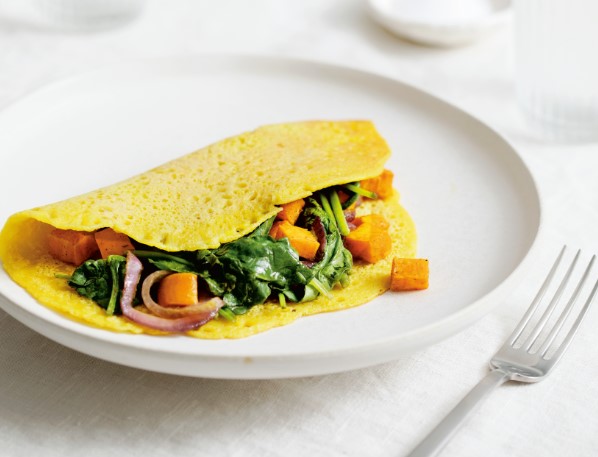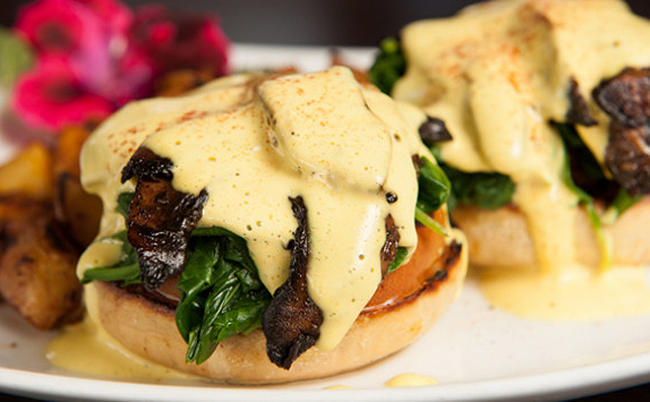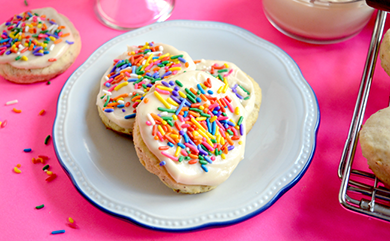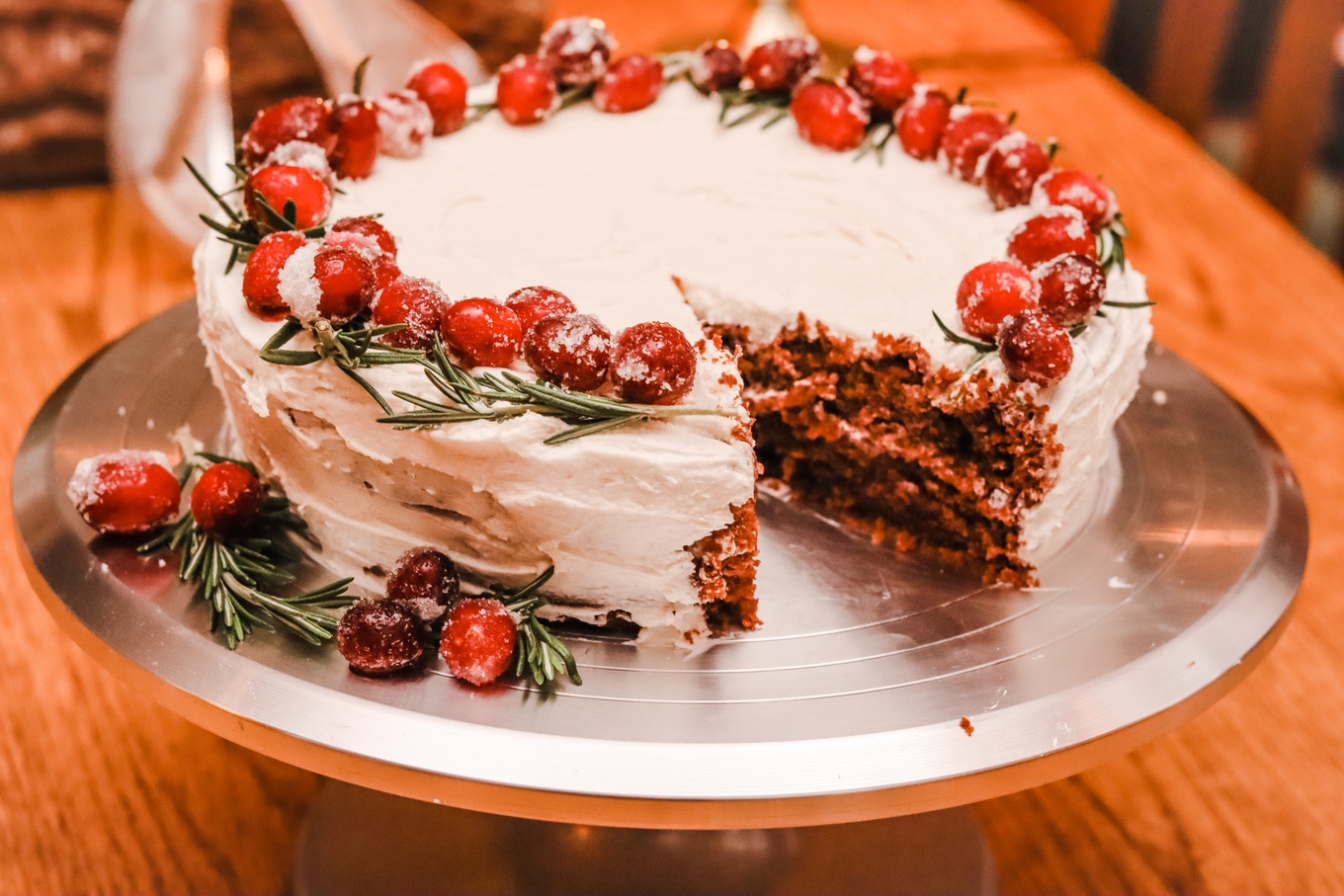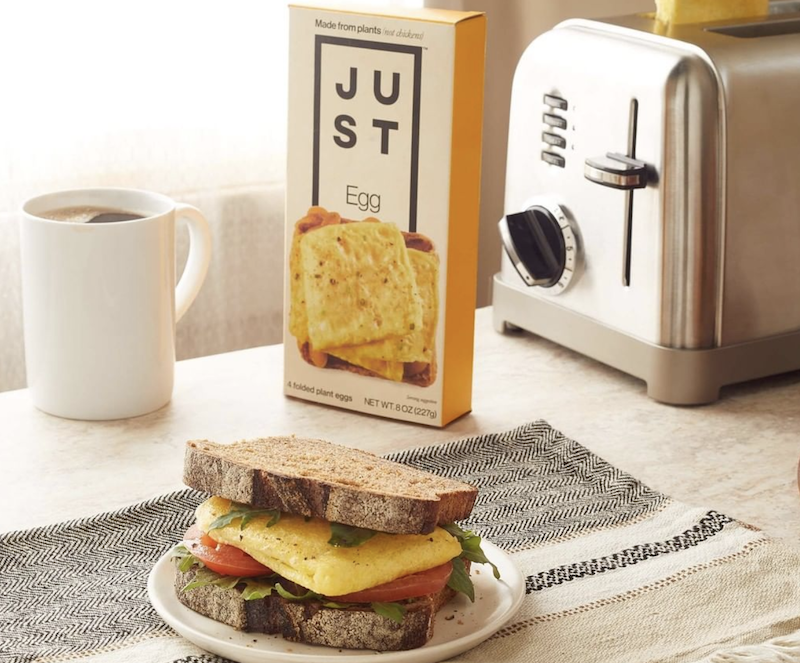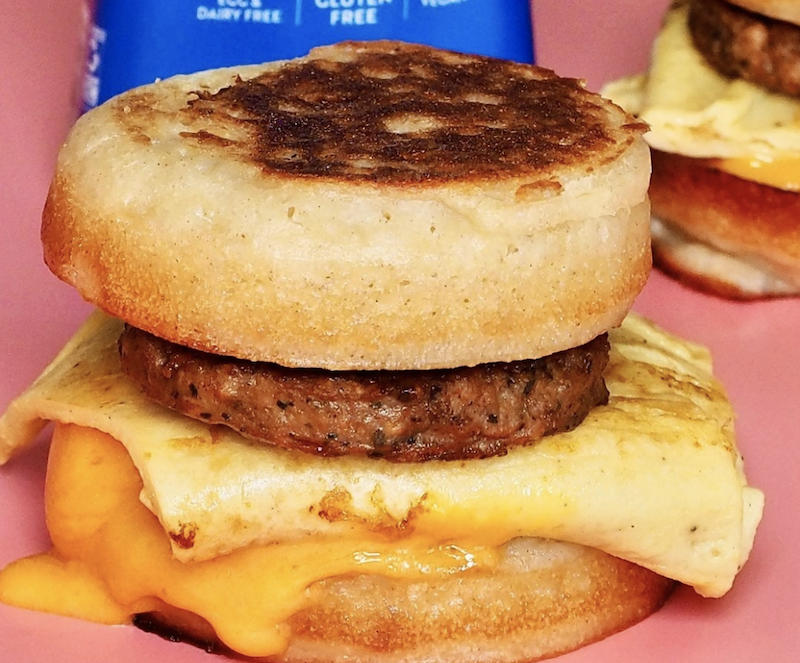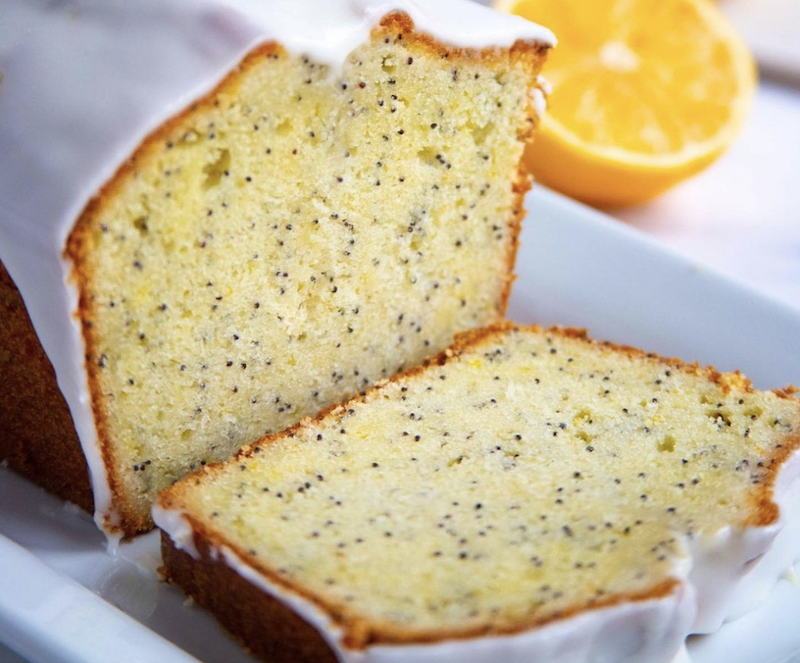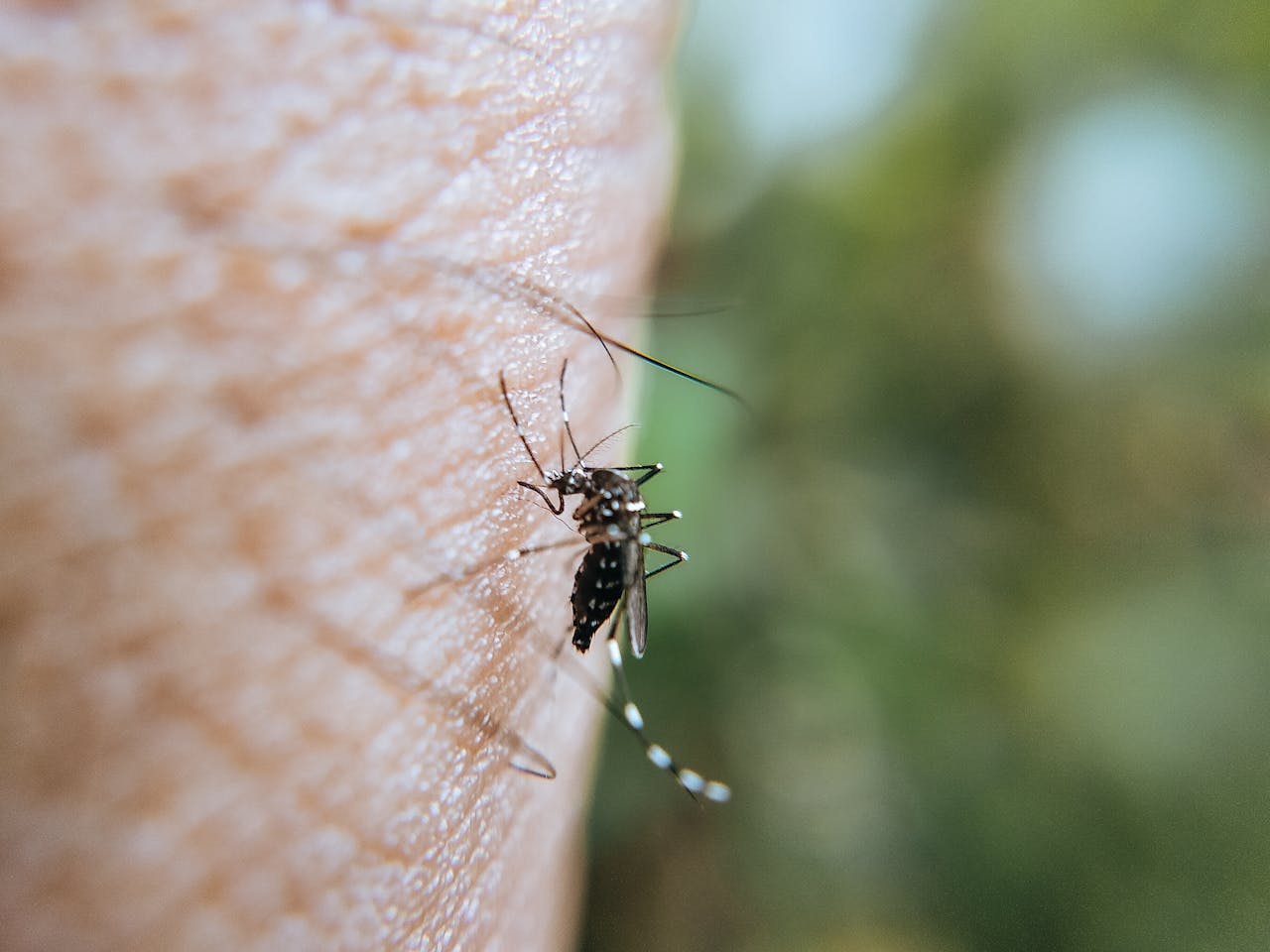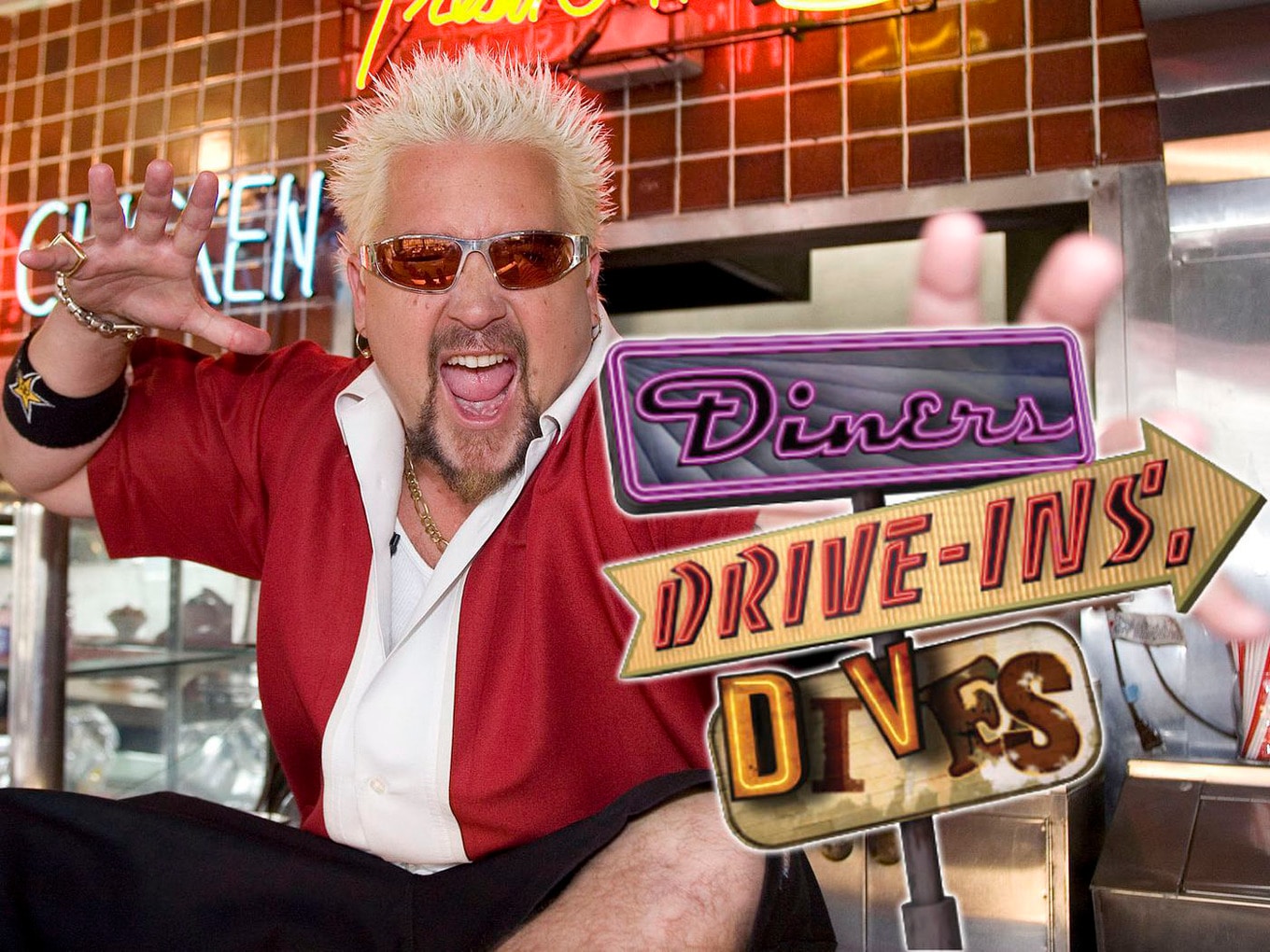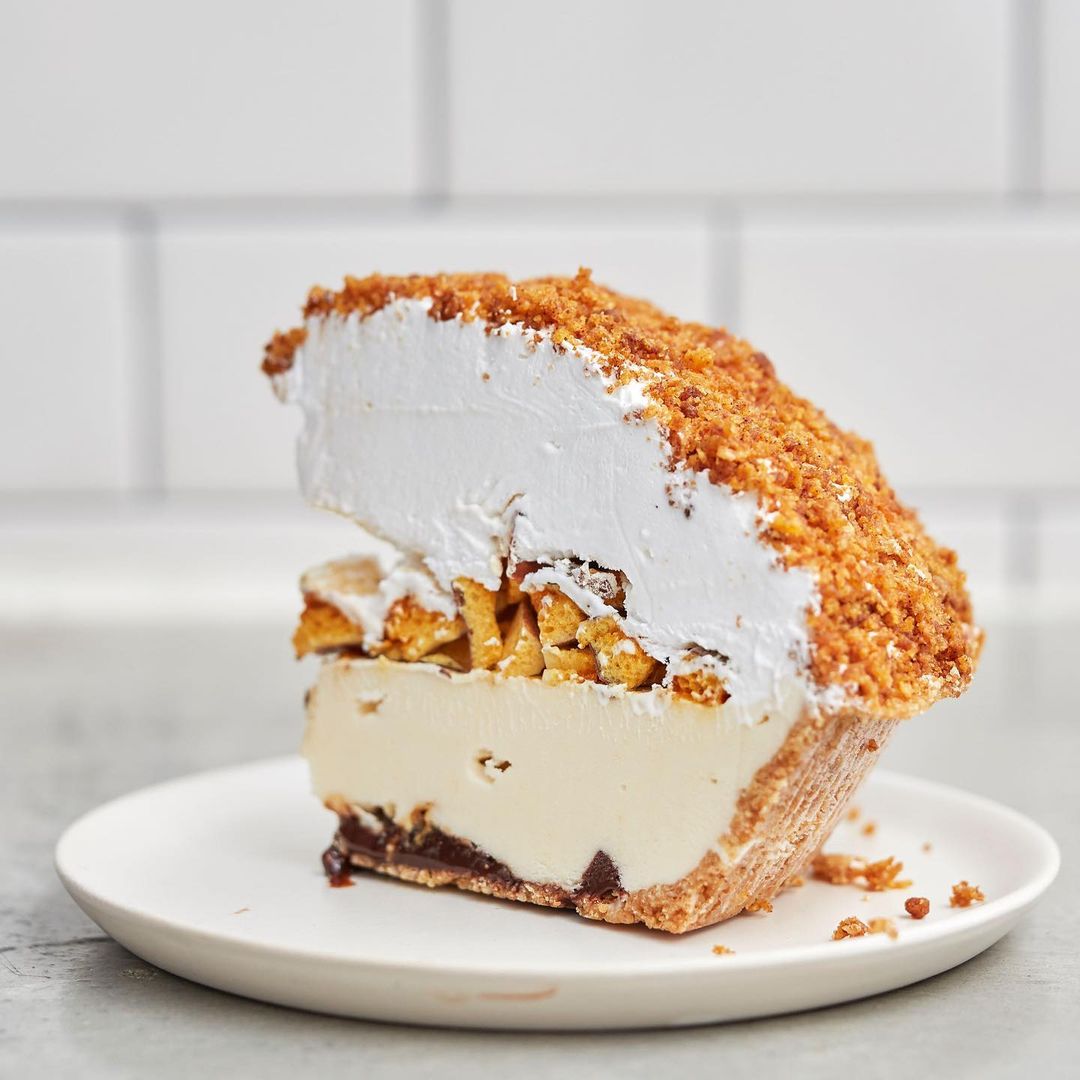The vegan egg has been perfected. From the yolky over-medium plant-based egg that tops Los Angeles eatery Crossroads’ carbonara to the impeccably light, crispy, and ever-so-chewy macarons made by chef Matthew Kenney’s vegan Ladurée pastries, chefs and innovators in the plant-based space have successfully replicated every form of chicken egg preparation out there. However, not all vegan egg replacers apply across every style of cooking, and when used in the wrong application, the results can be disastrous.
Alas, the trusty flax egg doesn’t work for everything, and all who’ve baked disappointingly flat cakes know it. This guide is here to help you get it right every time. Whether you’re making a simple scramble or attempting a vegan meringue for the first time, consult with us first to ensure a vegan win instead of an epic fail.
Table of Contents
What are chicken eggs?
Most people—at least, those of us who didn’t grow up around chickens—accept chicken eggs as a staple food without truly knowing what they are. Let’s start with the basics. Only female chickens (hens) can produce eggs. Unlike female cows who only produce milk after giving birth, hens naturally produce eggs as part of their reproductive cycle. Yes, the eggs people eat are part of the fowl equivalent to a human’s “time of the month.”
Daniel Tuttle/Unsplash
If inseminated by a rooster, some of the hen’s eggs will be fertilized and develop embryos—the very beginning stages of a chick. Ova—or underdeveloped yolks within a hen’s ovaries—that are not fertilized will grow and make their way down the oviduct until they are laid. These embryo-less eggs still contain many of the same parts of fertilized eggs—the protective shell, the bacteria-blocking membrane, the nutrient-dense albumen (egg white), and the vitamin-rich yolk.
In essence, chicken eggs are a byproduct of a hen’s reproductive system—more specifically, a byproduct of bird menstruation. Suddenly an albumen omelet doesn’t sound so appealing.
Are chicken eggs healthy?
Like dairy, chicken eggs are often touted as superfoods, or at the very least benign sources of protein. What egg-promoting folks don’t realize—or choose to ignore—is that chicken eggs contain cholesterol. A large egg contains 200mg of this waxy substance. While necessary for several bodily functions, it’s not necessary to obtain cholesterol from food, as the human body can produce cholesterol on its own. When excess cholesterol is present, it can build up in arteries causing partial or complete blockages that lead to heart disease.
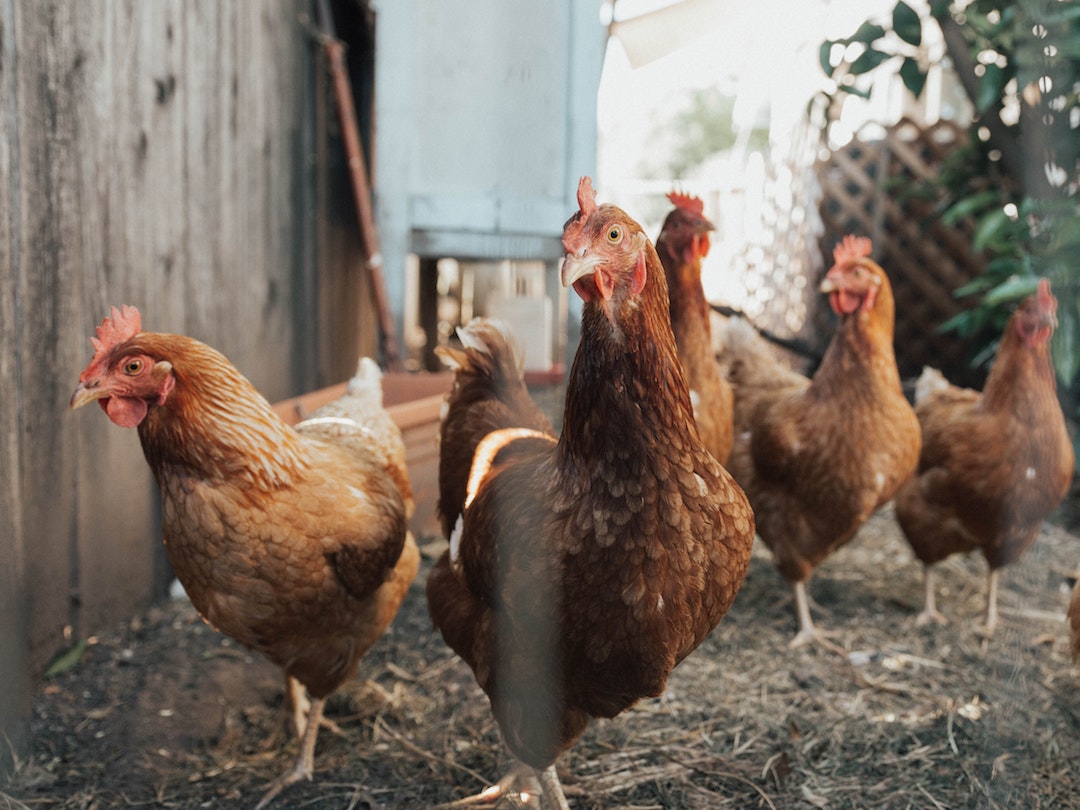 Ben Moreland/Unsplash
Ben Moreland/Unsplash
No, one or two eggs won’t kill you—a healthy person can regulate a little added cholesterol from time to time. However, those who incorporate eggs every day as a “healthy habit” should reconsider or at the very least get their cholesterol levels checked on the regular.
According to one 2021 study, published in PLOS Medicine, eating three eggs a week (which adds around 300 milligrams of cholesterol) raises the risk of premature death by around a fifth. “Intakes of eggs and cholesterol were associated with higher all cause, cardiovascular disease and cancer mortality,” the study’s co-author, Zhejiang University’s Professor Yu Zhang, said.
“The increased mortality associated with egg consumption was largely influenced by cholesterol intake.”
So yes, while chicken eggs do contain a high amount of protein and relatively few calories (six grams per 80 calories), the extra baggage of cholesterol isn’t worth it when a vast array of other foods provide these essential nutrients.
Animal welfare in the egg industry
Beyond the not-so-stellar nutritional profile, one must consider the animal welfare component before cracking an egg to make Grandma’s famous cookies.
Let’s start with the generic eggs that don’t claim to be “cage-free,” “free-range,” “local,” or promote any other marketing ploy. These affordable, everyday eggs are produced by chickens kept in battery cages. These wire cages (yes, even on the bottom) are used to confine hens in large-scale animal agriculture operations.
As of December 2020, 72 percent of all egg-laying hens were held in caged operations. Once they reach egg-laying maturity (around 18-20 weeks old), hens spend the rest of their (shortened) lives in these cages. Multiple hens are packed into these wire units, and while they do have room to turn around, they cannot spread their wings or walk off the nervous energy that comes with being packed into a poorly ventilated warehouse with hundreds of other anxiety-stricken birds. To decrease injury to one another, hens have their beaks “trimmed” by a laser when they are chicks. This isn’t like cutting your fingernails—it hurts as much as you think it would.
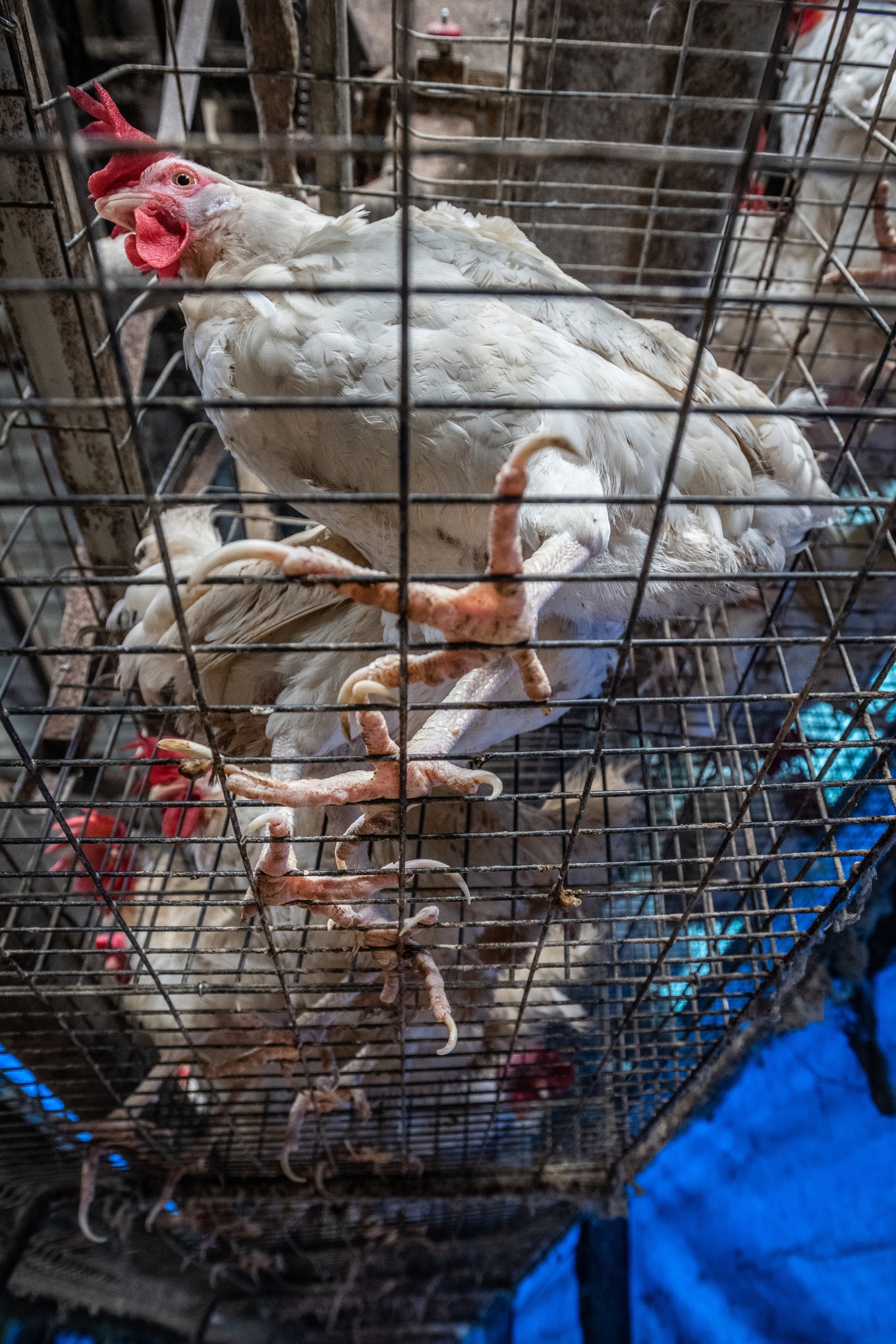 Jo-Anne McArthur
Jo-Anne McArthur
While the USDA allows the continued use of battery cages in egg production, some states such as California, Washington, Massachusetts, Colorado, and Rhode Island have passed legislation to phase out the use of cages over the next several years. Unfortunately, this doesn’t solve the issue of animal welfare.
Cage-free hens may still undergo beak trimming and be confined in warehouses without access to the outdoors—they just won’t be in cages. Free-range birds may also be kept in warehouses as long as they are granted some undefined amount of time outdoors—that could be 60 minutes or 60 seconds. And there is also the spread of disease to consider. In the UK, the free-range egg market is suffering because of outbreaks of bird flu. In early 2022, all free-range eggs had to be sold as barn eggs in the country because hens had to be kept inside to protect them from disease. But this is by no means a single country problem. The avian flu outbreak is still ongoing, and it’s global. In fact, it’s predicted that 50 million birds have now died of avian flu in the US alone.
But even for hens that are still classed as free-range, all of these rules go out the window when she loses her production value. Once she fails to produce eggs at industry speed, she’s sent to slaughter … that is, if she doesn’t die in the transport first. The rule stating animals cannot be held in trucks without food or water for more than 28 hours does not apply to birds. Food for thought the next time you hear a nonchalant, “Put an egg on it!”
What are vegan eggs made from?
The variety of vegan egg alternatives extends even beyond vegan meat or milk alternatives. Depending on what it’s being used for, vegan eggs range from simple home remedies such as flax meal and water to perfectly engineered liquid eggs made from mung bean protein isolate and gellan gum.
Eggs are used for a plethora of cooking and baking applications including binding, leavening, and adding moisture, and different plant-based foods are used to replicate these properties based on what’s needed. Keep reading to discover just what’s in every vegan egg variety.
How to replace chicken eggs in cooking
Whether you’re in the mood for a satisfying scramble or a sophisticated quiche, there’s a quality vegan egg replacement. Here is how to swap out chicken eggs in common cooking recipes.
1 Scrambled eggs
When it comes to a solid scramble, you’ve got options. Firm or extra-firm tofu is a classic. Simply press the excess moisture out of a block of tofu, crumble, and warm it through in a pan with a sprinkling of salt, pepper, and turmeric for color. The tofu method doesn’t require a ton of effort, but for minimal effort, reach for a bottle of liquid egg. The directions: scramble like an egg. Cook thoroughly. Products such as JUST Egg and Simply Eggless couldn’t make scrambled eggs any more convenient—you don’t even have to deal with a shell!
2 Quiches and omelets
A quiche and an omelet seem like very different things, but really, they’re both cooked, egg-based vessels for other tasty ingredients. One can make a satisfying quiche batter by blending firm tofu with spices, nutritional yeast, and a bit of non-dairy milk; an omelet batter is made in the same way, just with silken tofu. Alternatively, a batter of chickpea flour can also stand in for tofu when whipping up an omelet or quiche. As with the scramble, liquid eggs work wonders here, too.
3 Patties
Sometimes recipes for veggie burgers and loaves call for an egg as a binder. Tried and true, a flax egg is the perfect swap in this application. To make a flax egg, combine 3 tablespoons of flax meal with one tablespoon of water. Let it sit for a few minutes until the mixture forms a thick, gel-like consistency. It’s ready to use!
4 Sauces
Certain creamy sauces such as hollandaise and mayonnaise are traditionally made with an emulsion of eggs and fat (either butter or oil). A hollandaise can be replicated using a base of either silken tofu or cashews. The Curious Chickpea offers a recipe for both. Excellent vegan mayonnaise can be literally whipped up at home by blending oil and other ingredients with aquafaba (brine from a can of chickpeas). When whipped, this bean juice magically replicates the viscosity of egg whites. Granted, it may not be magic but science that makes this happen.
5 Sunny side up
Unless you’ve got a fairly advanced kitchen setup, we advise leaving this type of egg to the pros. A few vegan companies make ready-to-go, plant-based fried eggs for whenever you want to put an egg on it (hello, ramen). Try Be Leaf or All Vegetarian to start.
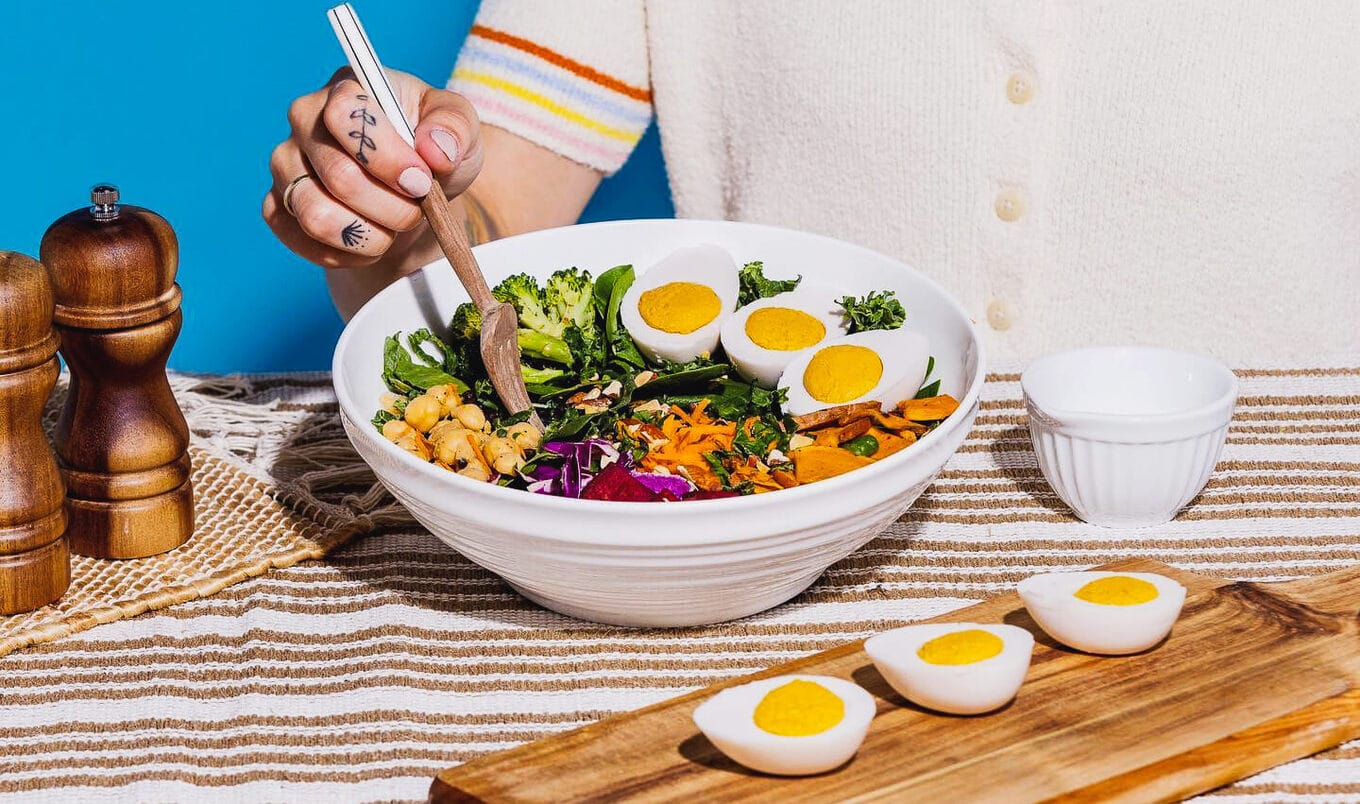 Crafty Counter
Crafty Counter
6 Hard boiled
This is yet another type of egg we recommend leaving to the professionals. Luckily, Crafty Counter’s vegan WunderEgg is now available at Whole Foods nationwide.
How to replace chicken eggs in baking
Baking is a science, and as such, vegan egg replacement must be exact. Not all plant-based eggs work in all baking recipes. Here’s what you need to know to avoid a baking fail.
1 Quick breads, brownies, and cookies
Sweets with some heft, such as banana bread, muffins, and brownies, are generally the most forgivable when it comes to egg replacers. A homemade flax egg often does the trick and sometimes something as simple as applesauce or pumpkin purée (use one-quarter cup purée mixed with one-quarter teaspoon of baking soda per chicken egg) will work well. Note: if you go the fruit mash route, make sure there’s fat elsewhere in the recipe—either in the form of vegan butter, oil, or nut butter. Without this fat content, your goods will turn out gummy. In regards to cookies, the flax egg tends to be more successful.
If you’re making gingerbread, British chef Nigella Lawson also has an unusual egg-replacer tip: prunes. During a segment on Good Morning America, Lawson showed viewers how to make vegan gingerbread (which she calls “luscious vegan gingerbread”) for the holiday season. First she melted together wet ingredients (like molasses, oil, and Lyle syrup), before adding brown sugar and prunes, which help to add flavor, but like eggs, help with structure too. She also added a dash of oat milk to help everything stick together.
Try this recipe
2 Cake
Classic cakes are lighter than quick breads and demand some lift. Vegan-as-is recipes typically rely on a combination of baking soda and/or apple cider vinegar to get the job done. If you’re trying to veganize a non-vegan cake recipe, try a powdered egg replacer. These contain the perfect ratio of binding agents and baking soda to mimic the chemical properties of eggs. On occasion, you may find silken tofu in a cake recipe. Some of these tofu-based cakes are fabulous, but they’re developed down to a science. We wouldn’t recommend swapping in blended tofu for eggs in a recipe that doesn’t specifically call for it.
Try this recipe
3 Custard fillings
Lemon bars, key lime pie, and pecan pie typically require egg yolks to obtain that thick, smooth, translucent custardy filling. Vegan bakers can replicate this texture (without altering the taste) with some protein-packed silken tofu. Generally, the mixture of sugar, cornstarch, fruit juice or extract, and silken tofu is blended together then cooked over a stovetop or baked in the oven until thickened. Most recipes use between eight to 12 ounces of tofu. Again, we recommend working with a vegan-as-is recipe for these bakes, but if you’re in the mood to experiment, we applaud your efforts.
Try this recipe
4 Meringues and macarons
When some baker either intentionally or coincidentally discovered the great egg white-replicating powers of aquafaba, the world of vegan meringues and macarons opened wide. These extremely delicious and delicate sweets are mostly egg whites and sugar—which means former egg replacers such as flax eggs, baking soda, and tofu simply will not work. When whipped aggressively for several minutes, aquafaba (chickpea brine) peaks and fluffs just like egg whites. It’s an astounding and magical process to behold.
Try this recipe
Best vegan eggs
The best vegan eggs may differ, depending on what you’re cooking up. However, here are just a few of the readily available vegan egg products we’ve thoroughly enjoyed cooking and baking with.
1 JUST Egg
The world marveled when this brand launched its liquid vegan egg back in 2011. True to its marketing, the eggy yellow substance really scrambles and bakes just like an egg. Beyond its plethora of uses for plant-based omelets, quiches, and baked goods, we love this product for its price. The company is continually working toward dropping the cost to consumers in order to make vegan eating more accessible to all.
Learn MORE
2 Follow Your Heart VeganEgg
The makers of Vegenaise have vastly expanded their product repertoire, debuting a powdered vegan egg in 2015. We’ve used it as a binder in countless sweet and savory recipes—from thick and fluffy pancakes to sweet and dense challah.
Learn MORE
3 Bob’s Red Mill Egg Replacer
Like Bob’s one-for-one gluten-free flour, the vegan egg replacer is a fairly dependable option if you’re looking to swap out eggs in a quick bread, cookie, or brownie recipe. You never know when the motivation will strike to veganize Aunt Edna’s famous zucchini bread.
Learn MORE

